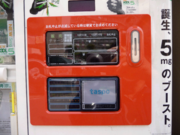
Taspo
Encyclopedia


Smart card
A smart card, chip card, or integrated circuit card , is any pocket-sized card with embedded integrated circuits. A smart card or microprocessor cards contain volatile memory and microprocessor components. The card is made of plastic, generally polyvinyl chloride, but sometimes acrylonitrile...
using RFIDdeveloped by the Tobacco Institute of Japan (TIOJ), the , and the for introduction in 2008. Following its introduction, the card is necessary in order to purchase cigarettes from vending machine
Vending machine
A vending machine is a machine which dispenses items such as snacks, beverages, alcohol, cigarettes, lottery tickets, consumer products and even gold and gems to customers automatically, after the customer inserts currency or credit into the machine....
s in Japan
Japan
Japan is an island nation in East Asia. Located in the Pacific Ocean, it lies to the east of the Sea of Japan, China, North Korea, South Korea and Russia, stretching from the Sea of Okhotsk in the north to the East China Sea and Taiwan in the south...
. The name "Taspo" is a portmanteau for .
The group announced plans for development of the Tobacco Card in 2001. The stated aim is to reduce smoking by underaged people. Testing began the following year, and a second round of testing followed in 2004.
Details of the card were announced in 2005. The card incorporates an integrated circuit that contains information about the age of the holder. Card issuance is restricted so that only adults aged 20 and over may acquire the cards. The cards are contactless, so that vending machines will be able to read them without contact. The cards are able to store value
Stored-value card
A stored-value card refers to monetary value on a card not in an externally recorded account and differs from prepaid cards where money is on deposit with the issuer similar to a debit card...
, giving purchasers the option to pay by card or by cash. Users are able to add more value at vending machines.
Consumers can apply for the cards by filling out a form available at tobacco retailers and mailing it, along with a copy of a verifiable identification document (driver's license, health-insurance card, etc.) and a facial photo to TIOJ. No fees are required to obtain the card. Cardholders can cancel lost or stolen cards by contacting TIOJ to remotely disable the cards' use at vending machines.
The final pilot program began in March 2008, and was phased in after that, becoming operational nationwide by 1 July 2008.
See also
- Geldkarte—In GermanyGermanyGermany , officially the Federal Republic of Germany , is a federal parliamentary republic in Europe. The country consists of 16 states while the capital and largest city is Berlin. Germany covers an area of 357,021 km2 and has a largely temperate seasonal climate...
(German languageGerman languageGerman is a West Germanic language, related to and classified alongside English and Dutch. With an estimated 90 – 98 million native speakers, German is one of the world's major languages and is the most widely-spoken first language in the European Union....
edition) - Smoking in JapanSmoking in JapanSmoking in Japan is much less restricted than in many other nations, and Japan accounts for much of the tobacco consumption in Asia. Nearly 30 million people smoke in Japan, making the country one of the world's largest tobacco markets...

